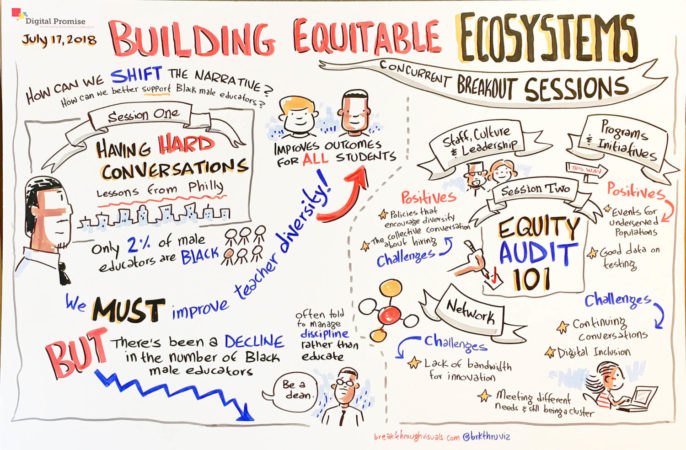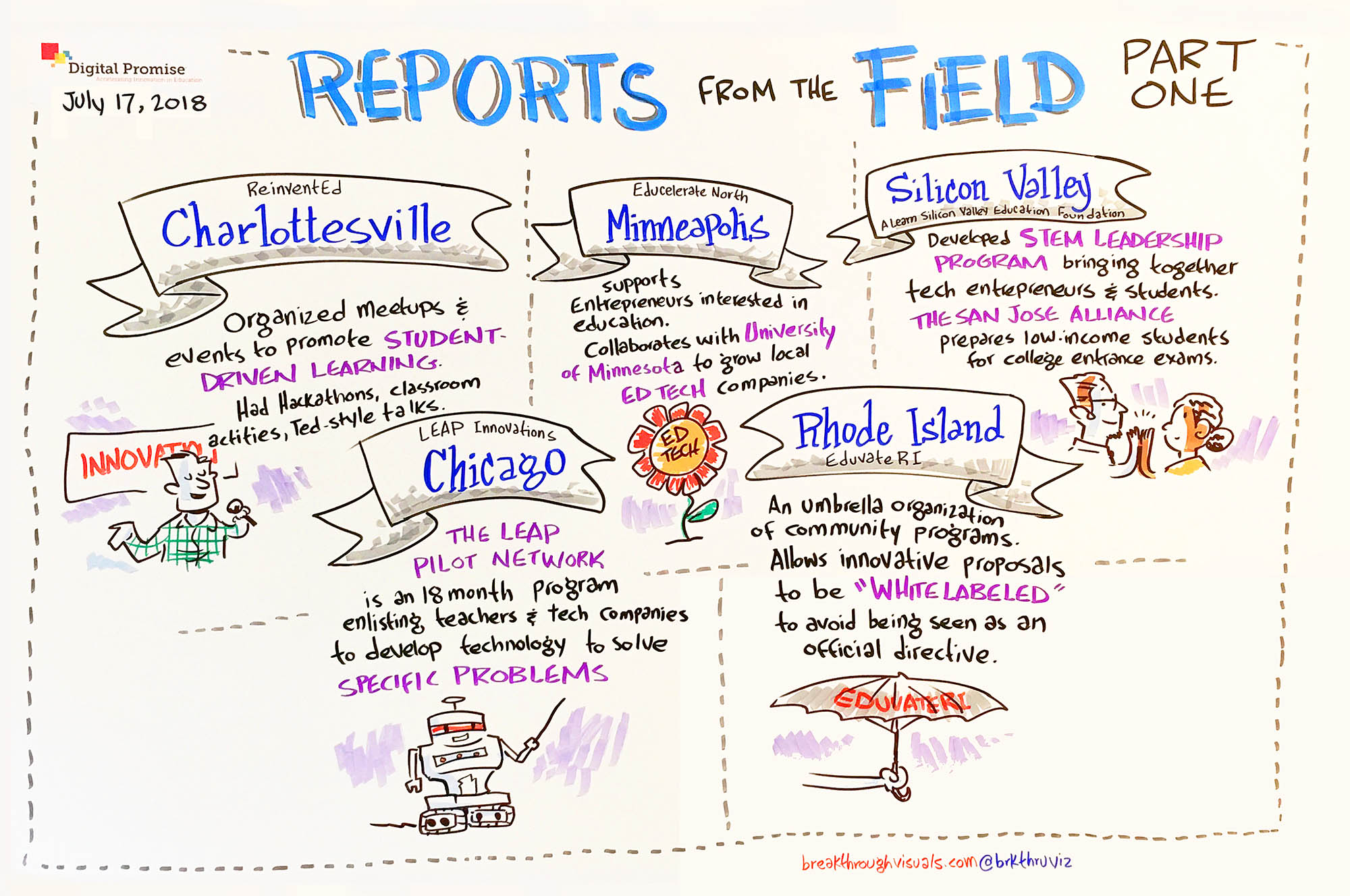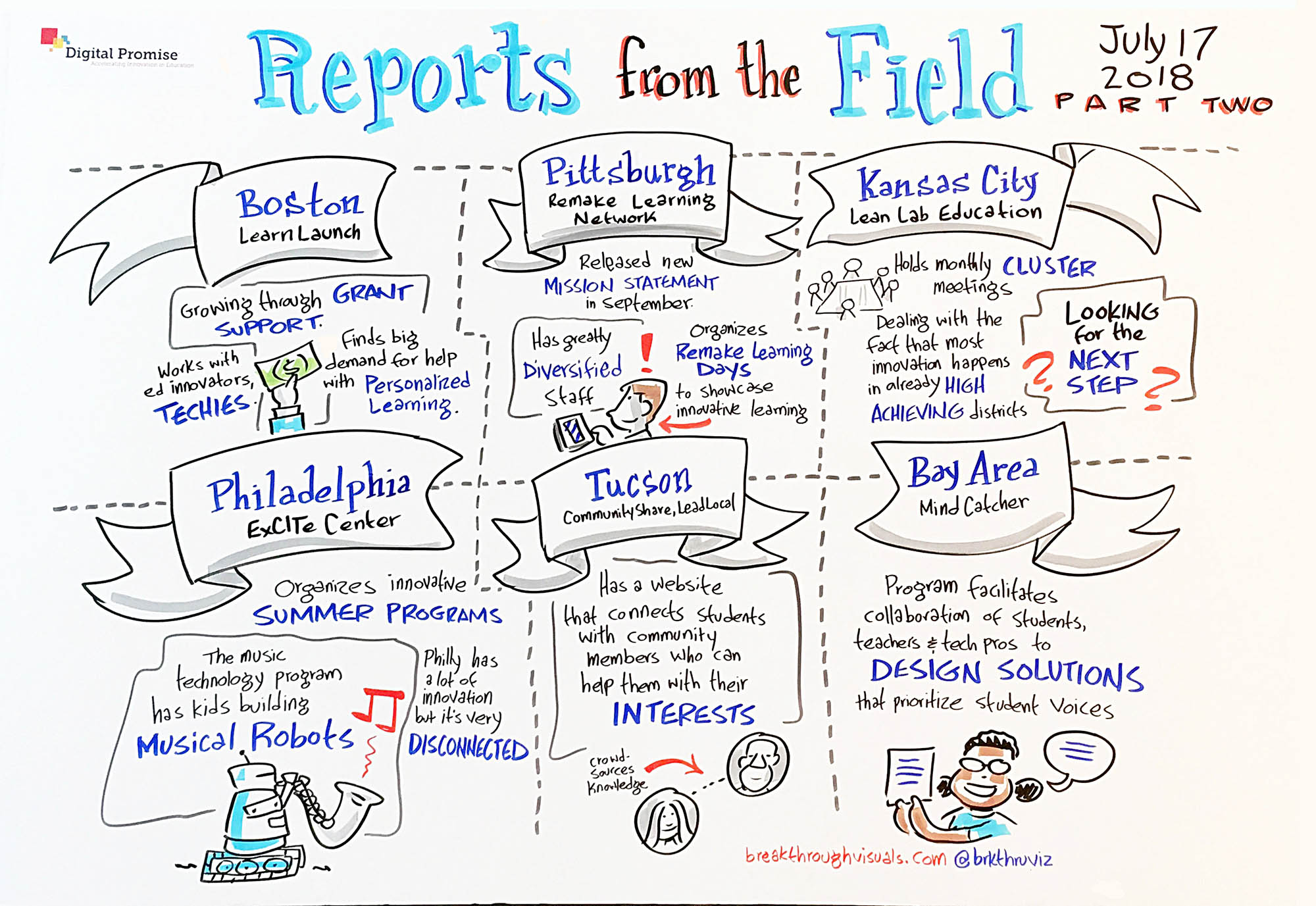
August 2, 2018 | By Cricket Fuller
On July 16-18, Digital Promise held the fifth annual Education Innovation Clusters Convening (#EdClusters18) in Philadelphia, with our co-host the ExCITe Center at Drexel University. #EdClusters18 brought together nearly 100 leaders from more than 20 regions and 48 organizations across the country working to advance future-facing teaching and learning.
#EdClusters18 focused on clarifying the future vision, tools, and action steps for education innovation. (See the full agenda here.) We asked ourselves these guiding questions: What can we do to improve and expand our work in communities across the country? How can we adapt EdClusters for long-term sustainability? Which strategies and tools can ground our work in equity, increase edtech efficacy, and develop stronger networks?
Excited to learn from other #EdClusters18 it is awesome to know hear about how so many people are working to unite people and find common ground to improve our world in this age of polarizing every subject. This is the path to true change and growth!
— Demetrius C. Roberts (@DoctorDRoberts) July 17, 2018
#EdClusters18 helped us look to the future with:
Over the past year, Digital Promise staff has refined our vision and goals for collaborative networks of education innovation across the country. Kim Smith, Executive Director of the League of Innovative Schools at Digital Promise, presented a new vision for EdClusters, which will guide our work into the next year:
Galvanize networks to design, validate, champion, and scale effective, innovative learning opportunities to advance equity and excellence for every student.
Kim Smith details a re-calibrated vision for #edclusters and League of Innovative Schools. 💪 #equity #excellence #EdClusters18 pic.twitter.com/JuTiRLUlnw
— Frank Bonsal III (@FrankBonsal) July 17, 2018
Katrina Stevens, Director of Learning Science at the Chan Zuckerberg Initiative, also shared a vision for how mature EdClusters can collaboratively design, evaluate, and scale promising tools and practices.


Several EdClusters at different stages of development shared their successes and challenges from work on the ground:
Keaton Wadzinkski of University of Virginia and ReinventEd leads a Roundtable discussion on growing an EdCluster in Charlottesville and nationwide.#EdClusters18 pic.twitter.com/CKXP43GaMp
— The ExCITe Center (@excitecenter) July 17, 2018
In keeping with an ongoing critical dialogue within EdClusters networks, the convening strove to elevate the conversation on educational equity:
Education is the social justice issue of our time…period. What will it take to produce a more equitable and reflective system? #Edclusters18 @BMECFellowship pic.twitter.com/M2qew1I8s7
— Carly Croman (@carly_croman) July 17, 2018
Around the country, EdClusters are developing tools and implementing initiatives to improve the reach, quality, and equity of their impact on learning in their regions. Many of their ideas are connecting stakeholders across sectors and building programs that are scaling nationwide:
Honored to have presented with @DoctorDRoberts and @TaylorMadeAE at #EdClusters18 about #RemakeDays & #PASEEDDays! When we collaborate across our regions AND across the state, PA wins. @CricketFuller @DigitalPromise @QuercusPrinus #RemakeLearning https://t.co/1Zj6V47i71 pic.twitter.com/uOABucNZlA
— Sunanna T Chand (@SunannaC) July 17, 2018
In order to improve their work, EdClusters are also seeking to understand the strength, health, and nature of their networks – to inform what gaps and opportunities exist in their partnerships, in order to better advance innovative education for all students.
@InnovateRI @D_Fairchild sharing the @eduvateri social network analysis work from this summer. Thanks for the opportunity, @CricketFuller @DigitalPromise #EdClusters18 pic.twitter.com/VPVoQbJnhB
— Dana Borrelli-Murray (@DBorrelliMurray) July 17, 2018
#EdClusters18 also showcased strategies and tools for improving the research-based practices educators use in schools – and the role EdCluster leaders can play in supporting and scaling them.
Part of ensuring the reach and impact of digital technology-enhanced learning in our ecosystem is about building the kinds of cross-sector collaborations and systems that help us assess what is working and what isn’t.
. @southjoseph just shared that the average school district uses 500 edtech products according to data from @LearnTrials #edclusters18 pic.twitter.com/R4mDEa1irU
— Jess Falkenthal (@Jfalkenthal) July 18, 2018
Learn more about the conversation in this EdWeek article.
Based on results from a live survey of #EdClusters18 attendees, we took a deep dive into five challenge topics around teaching and learning in EdClusters across the country:
Breakout groups analyzed root causes of the challenges in these areas and also strategized safe-to-fail experiments that can be employed in the short-term to improve our work in these areas. We are excited to track the ways in which these concrete actions will help spark change and foster discussion across the EdCluster network.
These and other challenge topics will also populate a “Challenge Agenda” that will inform the development of Cohorts and Challenge Collaboratives (see our blog here) to address these topics over the next couple of years.
During our three days in Philadelphia, our co-hosts at the ExCITe Center at Drexel University and their partners gave us a first-hand view of what authentic, community-based education innovation looks like for students, teachers, and administrators in the City of Brotherly Love.
Site visits on day one brought us to:
A huge thank you to @WorkshopSchool, @Villagephilly, and @PHLschools/PSTV
for hosting fantastic site visits for #EdClusters18 participants! You’re all doing incredible work! pic.twitter.com/EcNRjNMlxF— youngmoo (@youngmoo) July 18, 2018
Otis Hackney, Chief Education Officer for the City of Philadelphia, kicked off day two by talking about the kinds of culture, leadership, and practice changes required to equitably scale effective innovation for all students.
On our second night, Youngmoo Kim, executive director of the ExCITe Center at Drexel University, hosted us at the Center for an inspiring evening, during which:
Imp Qs from @SDPHite — challenging #EdClusters18: how do you square necessary disruptions of innovation with desire not to disrupt student lives? What does accountability look like when we’re mid-innovation? @InnovateRI @DigitalPromise @HighlanderInst @RIDeptEd pic.twitter.com/lthnaBYl3Z
— EduvateRI (@eduvateri) July 17, 2018
Amazing performers from the Arts Academy at Benjamin Rush @PHLschools at #EdClusters18! pic.twitter.com/hgIK2vibWC
— Digital Promise (@DigitalPromise) July 17, 2018
As we move forward in this work together, #EdClusters18 reminded us that we have the collective power to take actions that will improve education across the country. By centering equity in our work, building relationships with local partners, and improving our tools, we can be the “somebody” that advances powerful teaching and learning for our students and our communities.
This!…Thanks @DigitalPromise for a great opportunity to learn from education innovators around the country at #edclusters18 pic.twitter.com/xcU0RY7loM
— Kristi Poling (@k_pol_philly) July 18, 2018
We thank our #EdClusters18 attendees for sharing their hard work with our community. We also want to express our gratitude to this year’s funders—the Carnegie Corporation of New York and regional Philadelphia funders The Barra Foundation and ember at Spring Point—for making this convening possible. Stay tuned for information on #EdClusters19 by signing up for updates here!
https://www.youtube.com/watch?v=DsTejQP-ttQ
By Lauren McMahon and Heather Dowd